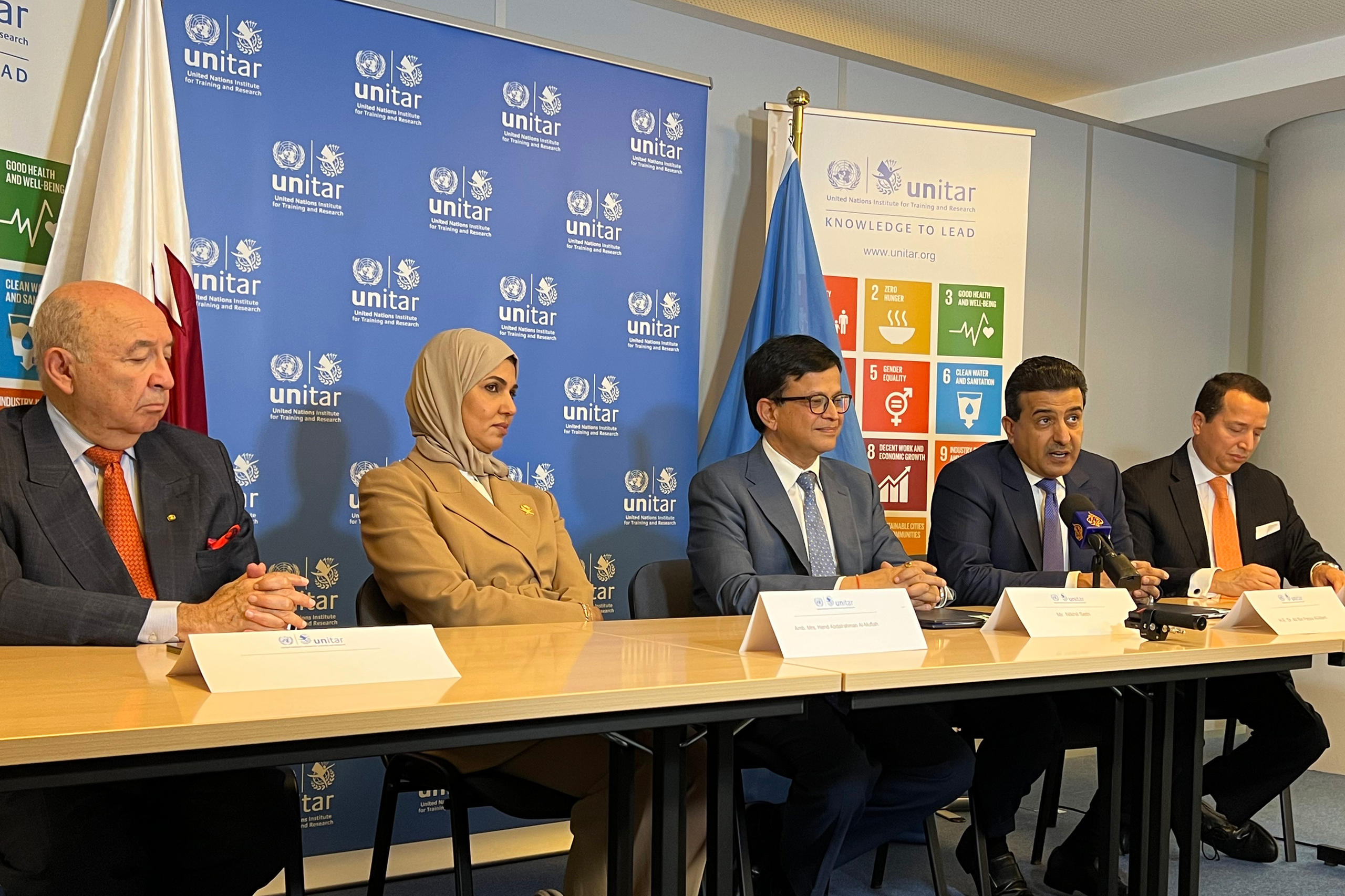Qatar heads UN labour conference despite poor rights record

The Qatari labour minister, whose name is mentioned in the “Qatargate” scandal at the European Parliament, will steer the UN conference in Geneva responsible for advancing global work conditions.
Qatar’s labour minister, Ali bin Samikh Al Marri, was elected on Monday to preside over the International Labour Conference (ILC), which runs until June 16 in Geneva. The flagship annual event of the International Labour Organisation (ILO) – the UN agency responsible for safeguarding workers’ rights – brings together government, employer, and worker representatives to further global work standards.
The election fittingly took place in Room XIX of Geneva’s Palais des Nations, a luxurious wood panelled room also known as “Qatar room” among diplomats. The tiny gulf state paid for its CHF20 million ($22.03 million) renovation in 2019.
As is usually the case at the ILC, Marri was elected by consensus. This means no one opposed his appointment and therefore no vote was taken. His election was nevertheless controversial from the outset.
The role of the president is largely honorary and organisational. Nonetheless it offers exposure to the international community and risks hurting the ILO’s reputation. His main tasks are directing debates, maintaining order, and ensuring consensus on issues that are discussed.
Although Marri has not been charged or accused of any wrongdoing, his name appears in the Belgian police’s investigation into the “Qatargate” scandal of alleged corruption at the European Parliament. Several European lawmakers are suspected of having accepted money from Doha to praise the Qatari government and downplay its labour rights abuses in the run-up to the 2022 FIFA World Cup.
Qatar has regularly been criticised by human and labour rights organisations for its treatment of migrant workers. According to an investigation by The GuardianExternal link, more than 6,500 of them have died in Qatar since 2010.
Marri had been the conference’s vice-president last year, before “Qatargate” erupted, and was therefore – as is common practice – nominated by member states for the presidency this year. The ILO secretariat was “not involved in any manner in the process for the election of the president,” a spokesperson told Geneva-based journalists last week.
In recent weeks, several trade unions, and labour and human rights groups had however expressed concerns about his nomination. They feared a Qatari presidency would be a blow to the organisation’s credibility and reputation. Some of them hoped that the ILO’s worker’s group – the executive branch that represents the interests of employees globally – would oppose Marri’s election and call for a vote.
“Qatar remains a deeply authoritarian state whose labour system continues to facilitate the types of abuses that the ILO was set up to eradicate,” the leaders of FairSquare, a UK-based NGO, wrote in an email to the International Trade Union Confederation (ITUC) on June 2. “We would encourage you as leader of the world’s largest global trade union body to mobilise members of the ILO workers’ group and invite them to call for a vote.”
But the worker’s group decided not to oppose Qatar’s presidency. Its spokesperson simply noted that some unions had expressed “serious doubts” about Doha’s commitment to improve the plight of migrant workers following the World Cup. She added that after consultations with Qatar under the auspices of the ILO a “joint understanding” about the need to speed up reforms had been reached.
Awkward timing
This Qatari presidency comes at an awkward time for the ILO. In March, The New York TimesExternal link published a story accusing the organisation of playing down labour abuses in the run-up to the World Cup, in response to lobbying from Doha. The ILO’s positive statements were echoed by EU politicians, some of whom later became suspects in “Qatargate”.
The ILO is a powerful organisation that can investigate governments and call out their abuses. In 2014, workers had lodged a complaint against Qatar at the ILO on the grounds that its government was violating forced labour and labour inspection conventions.
The so-called “kafala system” which tied migrant workers to their employers was a major concern. Human and labour rights activists argue that this practice makes workers vulnerable to forced labour and other forms of exploitation and abuse. Qatar has since dismantled the system, but NGOs say problems remain.
In 2017, rather than setting up a Commission of Inquiry, the ILO decided to close the complaint. Instead, it enteredExternal link a three-year “technical cooperation programme” with Qatar to strengthen its national regulation in line with international standards.
As part of this agreement, Qatar paid a $25 million contribution which financed the ILO’s office in Doha – an unusually large amount which was not publicly announced at the time of the deal. This left critics to question the ILO’s independence, but the organisation saysExternal link that there is nothing unusual about the agreement.
Since then, labour conditions in Qatar have improved. Doha has set up a minimum wage and claims migrant workers can change jobs without their employers’ permission. But they still cannot join or form trade unions. Over the past five years, Qatar has not ratified a single ILO convention. In comparison, neighbouring Saudi Arabia has ratified three. According to labour and human rights groups, worker abuse still takes place in the country.
It is not the first time that Qatar’s influence in Geneva-based organisations is questioned. Last year, SWI swissinfo.ch reported on how Doha launched, ahead of the World Cup, a carefully crafted global image-building operation through organisations it set up in the Swiss city.
Edited by Virginie Mangin

In compliance with the JTI standards
More: SWI swissinfo.ch certified by the Journalism Trust Initiative











You can find an overview of ongoing debates with our journalists here . Please join us!
If you want to start a conversation about a topic raised in this article or want to report factual errors, email us at english@swissinfo.ch.